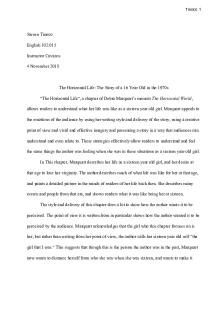Textual Analysis Ashleigh Manning PDF

| Title | Textual Analysis Ashleigh Manning |
|---|---|
| Author | Ashleigh-Kate Manning |
| Course | History |
| Institution | Massey University |
| Pages | 3 |
| File Size | 111.9 KB |
| File Type | |
| Total Downloads | 46 |
| Total Views | 144 |
Summary
N/A...
Description
201.114 – Roman Republic Assignment: Textual Analysis
Ashleigh Manning – 17340530
Assignment: Textual Analysis 201.114 Roman Republic
Ashleigh Manning (17340530)
201.114 – Roman Republic Assignment: Textual Analysis
LIVY 1.6: Livy on Romulus, Remus and the Foundation of Rome This passage by Titus Livius (Livy) is from ‘Ab Urbe Condita Libri’ or as it’s known in English, ‘History of Rome’. Written by Livy between 27BC and 25BC, it talks of the ancient Roman tale of Romulus and Remus, and how the settlements upon the seven hills came to be known as Rome. Livy writes in an annual chronology and narrative style.
The mains ideas or themes conveyed in this passage are royalty, competition and family – it describes Romulus and Remus from their early royal lives to the death of Remus by Romulus and the founding of Rome. Livy is noted to have written from a strong patriotic perspective, focusing on the development and growth of Rome.
This passage is important because ancient tales state that Romulus and Remus are the origins of Rome. An implication of the passage is that the overall book itself is an expansion of the Fasti (the public records kept by the magistrates, which were a primary source from Roman historians) – because it comes from the Fasti, it may not be entirely original and may be of a similar style to the Fasti.
This passage adds to our understanding as it gives us an insight to Roman belief of that time. It outlines an ancient myth that would and could have been passed down through the generations (like the Maori myth of Maui fishing up the North Island is passed through our history).
Barthold Georg Niebuhr argues that as Livy has gotten older and further into the ‘History of Rome’, the writing has declined in quality – “the writer has grown old and become loquacious…”. This would be a potential problem in using it as evidence because it becomes an unreliable source. Another problem in using this passage as evidence is that there is no solid proof of Romulus and Remus existing – throughout Roman history, historians have dismissed them as fairytale or myth because of this.
Ashleigh Manning (17340530)
201.114 – Roman Republic Assignment: Textual Analysis
LIVY 3.34: Livy on the drafting of the Twelve Tables
This passage by Titus Livius (Livy) is from ‘Ab Urbe Condita Libri’ or as it’s known in English, ‘History of Rome’. Written by Livy between 27BC and 25BC, it talks of how the Twelve Tables were established, which later led to the creation of modern law as we know it.
The mains ideas or themes conveyed in this passage are honour, politics and law – it describes how the Twelve Tables came to be established. Livy is noted to have written from a strong patriotic perspective, focusing on the development and growth of Rome.
This passage adds to our understanding as it gives us an insight to Roman belief and politics of that time. It outlines how the Twelve Tables were created, what processes were involved and how people reacted – which led to the modern laws we know.
Barthold Georg Niebuhr argues that as Livy has gotten older and further into the ‘History of Rome’, the writing has declined in quality – “the writer has grown old and become loquacious…”. This would be a potential problem in using it as evidence because it becomes an unreliable source.
Ashleigh Manning (17340530)...
Similar Free PDFs

Textual Analysis
- 3 Pages

Textual Analysis
- 2 Pages

Textual Analysis - Podcast
- 3 Pages

Textual Analysis Exercise
- 3 Pages

Perez Hilton Textual Analysis
- 16 Pages

Textual Analysis Outline
- 4 Pages

The Crito - Textual Analysis
- 5 Pages

Sitcom Textual Analysis
- 2 Pages

CYB103 Textual analysis
- 7 Pages

Textual Rhetorical Analysis
- 3 Pages

Lecture Notes Alan Manning
- 151 Pages

Strategy notes - Stephan Manning
- 83 Pages
Popular Institutions
- Tinajero National High School - Annex
- Politeknik Caltex Riau
- Yokohama City University
- SGT University
- University of Al-Qadisiyah
- Divine Word College of Vigan
- Techniek College Rotterdam
- Universidade de Santiago
- Universiti Teknologi MARA Cawangan Johor Kampus Pasir Gudang
- Poltekkes Kemenkes Yogyakarta
- Baguio City National High School
- Colegio san marcos
- preparatoria uno
- Centro de Bachillerato Tecnológico Industrial y de Servicios No. 107
- Dalian Maritime University
- Quang Trung Secondary School
- Colegio Tecnológico en Informática
- Corporación Regional de Educación Superior
- Grupo CEDVA
- Dar Al Uloom University
- Centro de Estudios Preuniversitarios de la Universidad Nacional de Ingeniería
- 上智大学
- Aakash International School, Nuna Majara
- San Felipe Neri Catholic School
- Kang Chiao International School - New Taipei City
- Misamis Occidental National High School
- Institución Educativa Escuela Normal Juan Ladrilleros
- Kolehiyo ng Pantukan
- Batanes State College
- Instituto Continental
- Sekolah Menengah Kejuruan Kesehatan Kaltara (Tarakan)
- Colegio de La Inmaculada Concepcion - Cebu



